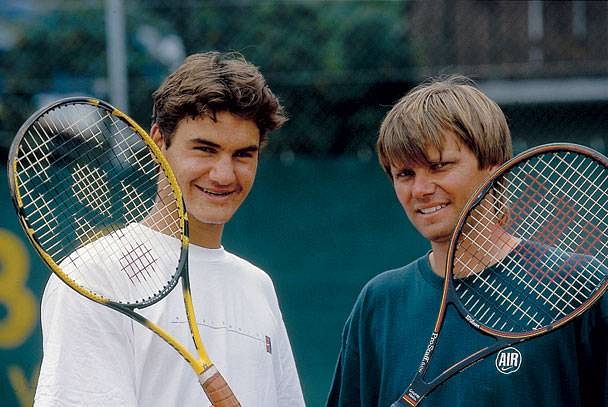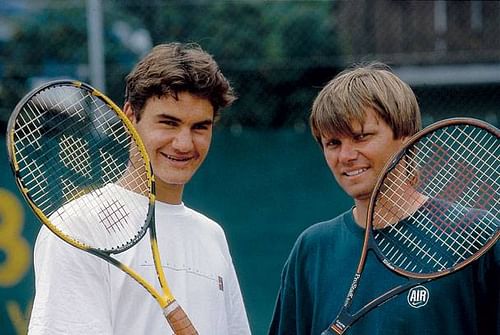
Peter Carter and his profound impact on the legendary Roger Federer
Every match he plays draws mammoth crowds no matter what stage it is at, and not without reason. He has won seventeen Grand Slams – more than any player in tennis history, and has a dynamism and a fluidity few, if any, players have ever exhibited in the long past of the game. Roger Federer is truly nothing short of legendary, an enigma in the world of tennis, an icon in sport and out of it.
At this year’s Australian Open, an elderly couple – not Federer’s own parents Lynette and Robert, but a pair of Australian seniors, sat watching the Greatest of All Time from the stands, something they do regularly.
They were not just any supporters, but a couple who had a long, touching association with the Swiss legend, one that dates back to the earliest days of his career.
Federer has had many coaches over the year, with his most constant companion in head coach, compatriot and friend Severin Luthi, who has been by Federer's side for nearly two decades. But a key figure in the Swiss’ formative years was a former Australian player named Peter Carter, who guided him in his teenage years.
Who was Peter Carter?
Carter, a tennis player himself, was born in South Australia – also to a father named Robert. He showed promise early on, and began being coached by a man named Peter Smith – the former coach of the youngest ever male World No. 1 in tennis history, Lleyton Hewitt.
Although a talented player and a constant presence on the ATP World Tour, Carter did not have much success in his personal results, and was dogged repeatedly by injury. This prompted him to turn quickly to coaching, and he became the captain of the Swiss Davis Cup after several years of coaching Federer.
He had such a profound influence on the young Swiss that Federer would go on to say at a press conference that he felt “Australian traits (are) locked into (my) tennis DNA.” Three years ago, Federer described Carter as instrumental in instilling in him the work ethic he has become well-known for today. “Work ethic was very important for Australians, so I think I profited a lot from that and early on for me Peter Carter was a very important man just overall for my character,” he said.
It was at Federer’s insistence that Carter would be appointed Davis Cup captain, and he was part of Federer’s squad much before Luthi entered the picture, guiding a 10-year-old Fed’s serve and basic game, and then rejoining him for a number of years in his late teens.
When they met
The two had first met when Federer was only 9. Carter had accepted a coaching job at the Old Boys Tennis Club in Basel, where Federer was then just starting out. His mother Lynette introduced him to Carter with the words “this is Roger.”
Little did anyone there know the meaning those words would go on to take.
The now stoic, calm mien most spectators have come to associate with Federer was not how he always was. As a young boy, the Swiss was, according to his family, notoriously short-tempered and unsure of his own abilities, and that was where Carter came in.
With a confidence in the young Federer that the man (then a boy) himself did not have, Carter moulded and shaped him, with even his own parents watching the young Swiss prodigy grow into the shoes of the player he would go on to become.
Federer grew close to the Carters then, and remained so ever since.
Carter had his own set of trials – his Swiss wife Silvia had had a long, intense battle with cancer, one she had recovered from – and it was to celebrate this, and the couple’s honeymoon, that Federer had recommended the pair travel to South Africa – his mother’s homeland.
Tragedy strikes
The two had birthdays only a day apart – Federer on the 8th of August, Carter on the 9th. On the 1st of August, 2002, a week before Federer’s 21st birthday and Carter’s 37th, Peter and Silvia Carter were on safari in the iconic Kruger National Park in Johannesburg, South Africa, celebrating their milestones – Silvia’s birthday the day before, Carter’s own a week later, and her successful fight against cancer.
Tragically, Carter and the driver of the Land Rover he was travelling were killed instantly as their car swerved off-road to avoid a collision with a minivan. The vehicle plowed through the railing of a bridge and plummeted into the river below.
The car landed on its roof, and both Carter and the driver were killed on the spot.
Federer was said to have been shattered by the news, and understandably so. It was said to have been even more of a shock to him given the destination had been his suggestion.
Playing a tournament in Canada at the time, sources at the hotel say Federer ran through the streets near his hotel in Toronto “screaming, bawling and crying,” and was absolutely inconsolable for a considerable period of time afterwards.
Carter passed away before Federer ever won a major, but he likely saw the profound impact he had on the young man, who played his next Davis Cup tie with Carter’s name emblazoned on the back of his jersey.
Ever since then, the Carters have received an itinerary via email with tickets to Melbourne Park – a tradition he has upheld for the last decade, with the Carters attending the Australian Open as his guests of honour.
Now, when people say Roger Federer’s coach, one thinks of Annacone, of Stefan Edberg, or the many idols Federer has entioned in interviews – but Peter Carter remains perhaps the most influential of them all.
